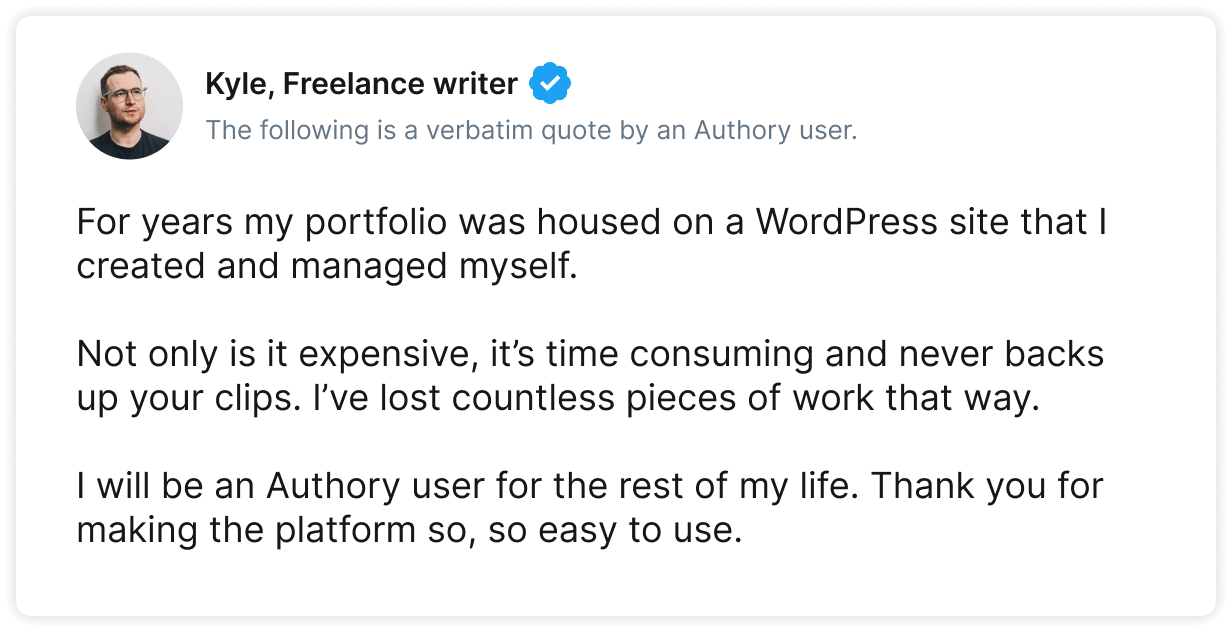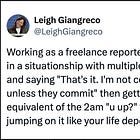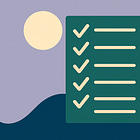The 10 best things I did for my freelance career
Do good work, aim high, invest in yourself, and don't forget to give back.
Hello friends, and welcome to week three of Intro to Freelancing Month!
Today we’re going to talk about setting up your career for long-term success and progression. Jumping into this life can feel daunting, confusing, and directionless — once you get started, sometimes you just hit that point: Where the hell do I go from here?
I’ve invited fellow freelancer Natasha Khullar Relph to help us figure this out. A while back I came across a post on LinkedIn from Natasha — now more than 20 years into freelancing — in which she dashed off a list of the best things she’s done for her freelance career. I loved her super positive outlook and realistic take on the industry, so I asked if she’d be up for expanding on her original post with some additional context and experience.
Take it away, Natasha!
***
When I first started freelancing, I was a 19-year-old college student in India. I had never written anything for publication, I had no experience, I had no contacts, and I certainly had no clue.
But looking back over my 20+ years as a freelance writer, I can see clearly that the decisions I made in those early years acted as the basic building blocks for what would become a profitable, long-term writing career. Here’s what I did that allowed me to succeed.
I went directly to my editors for advice
I stopped listening to advice from struggling writers, and I went directly to my editors for help instead. After pitching Time magazine daily for weeks and getting nowhere, I eventually sent the editor an email that said, “I’m not sure I have a good enough handle on what kind of ideas would work for you. Would you mind if I called you or dropped by your office to discuss how we can make this work?” He said yes, and I ended up becoming a freelance correspondent for the publication for many years.
I invested in my career
I joined paid writing groups and professional organizations. I made sure not to just listen to the advice, but implement it constantly, even if — especially if — it challenged my beliefs about the way things should be done.
I expected to be treated well
As a freelancer from India, disrespect from editors was not uncommon. Despite having written for both The New York Times and Time, a national radio broadcaster offered me a monthly contract that was equivalent to what they paid American reporters based in India for a three-minute audio piece. For both my sanity and my career, I made it a point to walk away from editors who didn’t respect freelancers, and went out of my way to make things easier for those who did.
I aimed high
I pitched editors at publications I thought were out of my league, and I often ended up with assignments from many who, surprisingly to me, thought I was an excellent fit.
Sponsorship
The portfolio that’s both auto-updating and always backed up
If you're a freelancer, you surely know these struggles:
1. Spending hours updating your portfolio page to keep it fresh.
2. Losing your work samples due to site shutdowns.
The good news? Authory has you covered! It automatically pulls in your content and creates a stunning portfolio that updates itself every time you publish. Plus, it backs up all your work, so you never have to worry about losing anything.
Ready to impress potential clients and employers?
I stayed in touch
I developed long-term relationships with my editors by calling them when in their cities and meeting them whenever possible. Even though it made me incredibly uncomfortable in the beginning, I got on video calls and tried to forge personal connections so I wouldn’t be easily forgotten.
I took risks
I experimented with the style, subjects, and variety of my work to give myself a chance to discover where I excelled. I learned about new technologies and built experience in different industries to avoid becoming bored or complacent.
I asked for honest criticism
I learned to take honest feedback from people I respected. I was grateful for the criticism, but I also learned to recognize people with hidden agendas. I constantly strived to get better at both writing and pitching — and still do!
I submitted only my best work
I gave it my best, whether I was being paid $200 or $2,000. Doing excellent work for small publications helped me show high-quality clips to editors at better-paying publications who were able to spot good writing even when they didn’t recognize the publication.
I gave back
I helped fellow writers and photographers break into publications I was already writing for. Sometimes, when they were able, they helped me back, too. Eventually, I put everything I know into a website called The Wordling, where I’ve published 100+ articles and created dozens of free resources, including a list of 200+ publications that pay $1/word or more.
I truly believed in my success
I was told I couldn’t do it from India. I was told it was impossible to make a decent living with it. I was told you could chase the awards or the money, but not both. I was told that if you wrote stories about social issues, you wouldn’t get paid for that work. (My highest-paying assignments have covered human rights issues.)
I learned to trust my gut and to allow myself to follow my own path, even if that meant I had falls along the way. I proved to myself that it didn’t have to be love or money. For me, it has been both.
Natasha is a freelance journalist with bylines in The New York Times, Time, CNN, BBC, ABC News, The CS Monitor, Ms., and more. She’s also the founder of The Wordling, where she publishes free resources for freelance writers, including this list of 200+ publications that pay $1/word or more. Look her up on LinkedIn.
Oh, a few other things …
• I offer one-on-one coaching! Need help developing an idea or sharpening one you already have? Want a seasoned eye on a pitch you’re kicking around? Interested in talking about careers and building your freelance business? Maybe just want an edit on a story draft? I’ve got you covered! Click below to book a one-on-one coaching session to talk about pitches, story ideas and development, editing, careers, or anything else you might need help with!
• Get a pitch commissioned recently? I want to see it! I’d love to feature you and your #pitchesthatsold in an upcoming series examining great pitches that resulted in stories. Let’s see ’em!
• More from Intro to Freelancing Month:










Hi Tim, do you have a past post or workshop about writing op-eds? I'm having trouble finding one if you wouldn't mind sharing a link! If not, would love to see that in the future!
Will the workshop on Thursday be recorded? I can’t make it in real time but would love to still learn